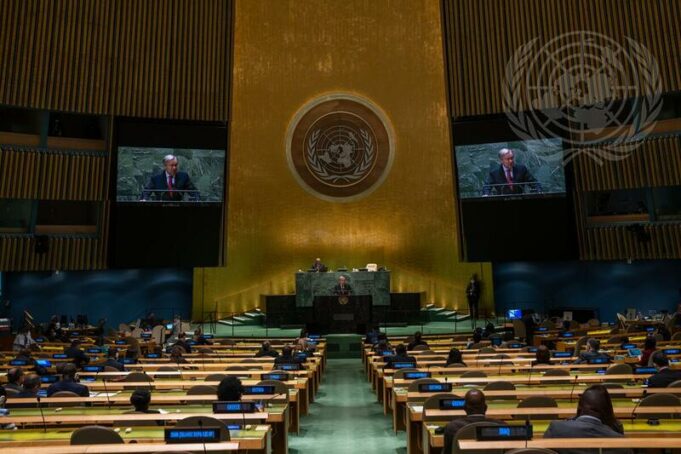UN chief Antonio Guterres has called for reparations over the Trans-Atlantic trafficking of enslaved people as a way to tackle its legacy in today’s society, including systemic racism.
In a statement marking the International Day of Remembrance of the Victims of Slavery and the Trans-Atlantic Slave Trade, Guterres said slavery has “laid the foundations for a violent discrimination system based on White supremacy that still echoes today.”
“We call for reparatory justice frameworks to help overcome generations of exclusion and discrimination,” Guterres said.
From the 15th to the 19th century, at least 12.5 million Africans were kidnapped, forcibly transported by European ships and merchants, and sold into slavery. Those who survived the brutal voyage ended up toiling on plantations in the Americas, mostly in Brazil and the Caribbean, while others profited from their labor.
“Many of those who organized and ran the Trans-Atlantic Slave Trade amassed huge fortunes. Meanwhile, the enslaved were deprived of education, health care, opportunity, and prosperity,” the UN chief said.
According to Guterres, the lives of those who fell victim to slavery were “ruled by terror,” as they were subjected to rape, flogging, lynchings, and other atrocities and humiliations.
“We appeal for the space and necessary conditions for healing, repair, and justice. And above all, we resolve to work for a world free from racism, discrimination, bigotry and hate,” he added.
On March 25, UN General Assembly president Dennis Francis also highlighted the harrowing journeys endured by millions during the so-called middle passage, stripping them of their identities and dignity.
“It is inconceivable that the enslaved were cruelly regarded as mere commodities for sale and exploitation,” Francis said.
“Together with their children born into slavery, perpetuating the vicious cycle of bondage and suffering—enduring untold horrors at the hands of their oppressors,” he added.
Francis also called for accountability and reparations as essential components of pursuing true justice, stressing the urgent need to address systemic racism and discrimination faced by people of African descent, both historically and in contemporary society.
“It is incumbent upon states, institutions, and individuals to acknowledge their roles in perpetuating these legacies of injustice—and to take meaningful steps towards reparatory justice,” he said.
Last September, a UN report proposed that nations should contemplate providing financial reparations as a means to redress the injustices of slavery.
The concept of compensating for slavery through reparations or other forms of restitution has a lengthy historical background, and it is currently gaining significant traction on a global scale.
“This is the movement that will signal, finally, the collective victory of humanity, of good over evil,” Hilary Beckles, chair of the reparations commission of the Caribbean Community Political and Economic Union (CARICOM), said at the UN general assembly.
The CARICOM reparations commission was established to pursue reparations, which may include debt forgiveness and assistance in addressing public health emergencies, from former colonial powers like the United Kingdom, France, and Portugal.
It is time for “Britain and other former and current colonial powers to own up to their responsibility,” said Verene Shepherd, director of the Center for Reparation Research at the University of the West Indies. (UN News)













